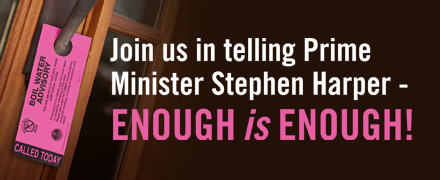
The Enough is Enough campaign is in collaboration with the Assembly of First Nations and the Safe Drinking Water Foundation
A January 2012 report by Health Canada says 161 water systems in 116 First Nations were under some form of drinking water advisory. This is equal to nearly one in five (18 per cent) of all First Nations.
It is unacceptable that any Indigenous people in Canada – First Nations, Métis and Inuit - should be subjected to conditions where there is no access to safe drinking water. Numerous examples of the deplorable conditions that exist in many First Nations clearly demonstrate that access to clean water for all First Nation citizens is not a priority for the federal government. These conditions would not be tolerated in any other Canadian communities, and if they do occur, swift and decisive action is the norm and is expected.
Protecting our water from the harmful effects of development is a responsibility we all share. Clean drinking water is a right for all.
Governments must work with First Nations and the public in the delivery and development of a clear, responsible, sustainable water management plan. This plan must include water regulations supported by proper funding for water and wastewater treatment plants, training for water operators, adequate baseline studies, proper monitoring, cumulative impact assessment, and ensure important habitat is projected for fish and wildlife.
When you send your support e-mail, CUPE will collect your e-mail address and store it securely. Your e-mail will not be sold or shared with other organizations without your consent.
We will contact you by e-mail about CUPE initiatives, as well as social justice and political action campaigns. See our Privacy Policy.